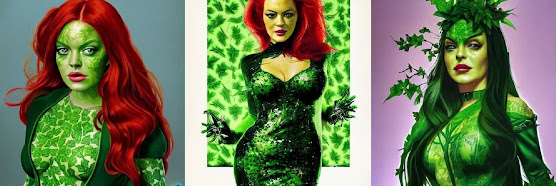Poison (pronounced poi-zuhn)
(1) A substance with an inherent property that can impair function, cause structural damage, or otherwise injure or destroy life or impair health.
(2) Something harmful or pernicious, as to happiness or well-being.
(3) A slang term for alcoholic liquor.
(4) To administer poison to (a something living).
(5) To ruin, vitiate, or corrupt.
(6) In chemistry, a substance that retards a chemical reaction or destroys or inhibits the activity of a catalyst or enzyme).
(7) In nuclear physics, a substance that absorbs neutrons in a nuclear reactor and thus slows down the reaction. It may be added deliberately or formed during fission
1200-1250: From the Middle English poisoun, poyson, poysone, puyson & puisun (a deadly potion or substance (and figuratively, "spiritually corrupting ideas; evil intentions,"), from the twelfth century Old French poison & puison (drink, especially a "medical drink" (later "a (magic) potion; a poisonous drink"), from the Latin potionem (nominative potio) (a drinking, a drink) (and also "a poisonous drink"), from potare (to drink), from the primitive Indo-European root poi- & po- (to drink). The earliest Lastin forms were pōtiōn (drink, a draught, a poisonous draught, a potion), from pōtō (I drink) & pōtāre (to drink). The Middle English forms displaced the native Old English ator. The Latin pōtiōn is the stem of pōtiō, the derive forms being pōtio & pōtiōnis.
The evolution
from Latin to French followed the pattern of other words (eg raison from rationem), the Latin word also the source of Old Spanish pozon, the Italian pozione and the Spanish pocion. The modern and more typical Indo-European
word for this is represented in English by virus and the slang sense of
"alcoholic drink" is an Americanism dating from 1805. Figurative use was first noted in the late
fifteenth century although it appears not to have been applied to persons until
1910. It was used as an adjective from the
1520s; with plant names from the eighteenth century. Poison ivy first recorded 1784; poison oak in
1743, poison in 1915. Poison-pen, the
trolling of the time, was popularized 1913 by a notorious criminal case in
Pennsylvania although the phrase dates from 1898.
Three portraits of Lindsay Lohan as Poison Ivy by Alex Ross. Poison Ivy is a comic book character in works published by US company DC Comics. Poison Ivy is one of Batman's many enemies.
The sense evolution was from "drink" to "deadly drink". In some Germanic languages "poison" is aligned with the English gift (eg the Old High German gift, the German Gift, the Danish & Swedish gift and the Dutch gift & vergift). This shift may have been partly euphemistic and partly the influence of the Greek dosis (a portion prescribed (literally "a giving")), used by Greek physicians to mean "a quantum of medicine". Of persons detested or regarded as exerting baleful influence, poison and poisonous were in use by 1910 while the slang meaning "alcoholic drink" recorded as an an early nineteenth century invention of American English (as in "what's your poison?"); potus as a past-participle adjective in Latin meant "drunken". The verb in the sense of "to poison, to give poison to" dates from the circa 1300 poisonen, from the Old French poisonner (to give to drink) and directly from the noun poison. The figurative use in the sense of "to corrupt" emerged in the late fourteenth century.
Venom (pronounced ven-uhm)
(1) The poisonous fluid that some animals, as certain snakes and spiders, secrete and introduce into the bodies of their victims by biting, stinging etc.
(2) Something resembling or suggesting poison in its effect; spite; malice.
(3) Poison in general (inaccurate, now archaic).
(4) To make venomous; envenom (archaic).
(5) Malice, spite.
1175–1225: A variant of the Middle English venim & venym (poison secreted by some animals and transferred by biting) from the Anglo-Norman & Old French venim, venin (poison; malice), from the Vulgar Latin venīmen (source also of the Italian veleno and the Spanish veneno), from the Latin venēnum (magical herb or potion, poison (and in pre-Classical times "drug, medical potion" also "charm, seduction" probably originally "love potion")). Root was the Proto-Italic weneznom (lust, desire), from the primitive Indo-European wenh (to strive, wish, love) from wen (to desire; to strive for). Related are the Sanskrit वनति (vanati) (gain, wish, erotic lust) and the Latin Venus. The variously deformations in post-Latin languages happened apparently by process of dissimilation. The modern spelling in English was common by the late fourteenth century and the meaning "bitter, virulent feeling or language" dates from circa 1300.
Not interchangeable
A venomous white-lipped pit viper (Trimeresurus insularis), ready to strike. The lovely blue ones are rare; most are green.
Poison and venom are often used interchangeably because once in the body, the chemicals can do similar damage, attacking the heart, brain or other vital organs but the meanings are different. That said, there are many venoms which can be ingested without ill-effect because they are dangerous only if entering the bloodstream although that can happen through a minor cut in the mouth so the practice is not without risk. Typically, venomous creatures bite, sting or stab their victims whereas for poisonous organisms to affect the living, they have to be bitten, inhaled or touched. The venomous thus need a way in, like fangs or teeth. The useful rule is: If one bites something and one dies, what one bit contained poison; if something bites one and one dies, one was bitten by something venomous. Although a fine distinction for those who have died from either cause, it's an important difference for those signing death certificates.
Just after Christmas 2017, while on holiday in Thailand, Lindsay Lohan was bitten by a snake and while said to have made a full recovery, there was never any word on fate of serpent which, presumably, wasn't venomous. The syndicated story on the internet attracted comment from the grammar Nazis who demanded proof the snake really was taking a Thai holiday.



No comments:
Post a Comment